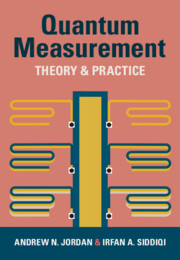Book contents
- Frontmatter
- Dedication
- Contents
- Preface
- Acknowledgments
- List of Symbols
- 1 Introduction to Quantum Physics and Measurement
- 2 Projective Measurement
- 3 Generalized Measurem
- 4 Weak Measurement
- 5 Continuous Measurement: Diffusive Case
- 6 Continuous Measurement: Quantum Jump Case
- 7 Linear Detectors
- 8 Quantum Amplification
- 9 Measurement-Related Phenomena and Applications
- 10 Feedback and Control
- 11 Epilogue: What Does It All Mean?
- Appendix A Review of Classical Probability Theory
- Appendix B Mixed Quantum States
- References
- Index
5 - Continuous Measurement: Diffusive Case
Published online by Cambridge University Press: 10 May 2024
- Frontmatter
- Dedication
- Contents
- Preface
- Acknowledgments
- List of Symbols
- 1 Introduction to Quantum Physics and Measurement
- 2 Projective Measurement
- 3 Generalized Measurem
- 4 Weak Measurement
- 5 Continuous Measurement: Diffusive Case
- 6 Continuous Measurement: Quantum Jump Case
- 7 Linear Detectors
- 8 Quantum Amplification
- 9 Measurement-Related Phenomena and Applications
- 10 Feedback and Control
- 11 Epilogue: What Does It All Mean?
- Appendix A Review of Classical Probability Theory
- Appendix B Mixed Quantum States
- References
- Index
Summary
Chapter 5 considers the case of diffusive continuous measurements, where the measurement outcomes and quantum state dynamics are analogous to a Brownian noise process. We motivate this type of measurement by considering the example of a double quantum dot system being measured by a quantum point contact. The intrinsic shot noise of the measurement naturally brings about an effective time-continuous measurement. A second example of a superconducting circuit made from Josephson junctions readout with a microwave frequency electromagnetic wave is also discussed in detail. The mathematics of quantum trajectory theory is then pedagogically built up, resulting in the stochastic Schrodinger equation, the stochastic master equation, and the stochastic path integral. We also discuss experimental data and its comparison with this theoretical formalism. These experiments allow us to peer into the inner workings of wavefunction collapse, giving an empirical handle on the many philosophical issues that arise in quantum measurement.
Keywords
- Type
- Chapter
- Information
- Quantum MeasurementTheory and Practice, pp. 90 - 128Publisher: Cambridge University PressPrint publication year: 2024

